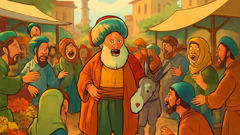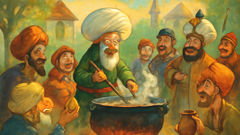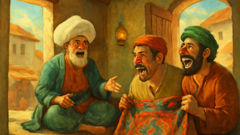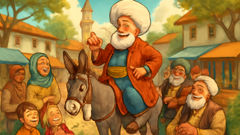Introduction
In the golden heartlands of medieval Anatolia, where the horizon is a rolling patchwork of sun-baked fields and sleepy villages cluster around meandering rivers, there lived a man whose wit could cut through the thickest fog of confusion and whose laughter echoed louder than the muezzin’s call at dawn. Nasreddin Hodja—donning his famous turban, astride his equally famous donkey—was no ordinary figure in these lands. He was a sage, a jester, and a philosopher all at once. His tales—woven through countless evenings in candlelit homes, bustling market squares, and shaded tea gardens—remain as vivid and alive today as they were centuries ago. Every villager, from children with sticky hands to elders with silvered beards, waited eagerly for the next joke or anecdote. But the magic of Nasreddin Hodja’s stories was never in the punchline alone. Each twist of his words held a glimmer of truth, a gentle prod at pride, or a clever nudge toward wisdom. Whether quipping with the local imam, outwitting greedy merchants, or teaching the sultan a lesson in humility, Hodja’s adventures painted a world where laughter and learning walked hand in hand. His humor, never cruel, always revealed the deeper currents of village life—human folly, simple joys, stubborn traditions, and the ever-turning wheel of fortune. To listen to Nasreddin was to glimpse the world from a slightly tilted angle, where sense and nonsense mingled and even the smallest donkey could upend the mightiest ruler. In this collection, we journey into that bustling, sunlit Anatolian world. We follow Nasreddin Hodja through olive groves and stone-paved streets, under the gaze of snow-capped mountains and across the busy expanse of the bazaar. Here, satire and wisdom are inseparable, and every tale invites us not just to laugh, but to see ourselves—our quirks, our questions, our hopes—in the mirror of Hodja’s legendary mischief.
The Clever Donkey and the Foolish Crowd
Nasreddin Hodja’s donkey was nearly as famous as the man himself. Some said it was cleverer than most villagers, others claimed it had a mind of its own. The truth was somewhere in between, as with most things in life. On a morning scented with wild thyme and honey, Nasreddin led his donkey into the heart of Aksehir’s bustling bazaar. Merchants hawked olives and figs, spice sellers fanned their wares into the air, and children darted between stalls with sticky sweet treats in hand. At the center of this noisy whirlpool, Hodja stopped, dismounted, and tied his donkey to a post.

Villagers gathered quickly. “Hodja, why are you walking when you have a donkey?” asked a man with an enormous mustache, arms folded over his chest. Nasreddin smiled, “I don’t want to tire my loyal companion.” Laughter rippled through the crowd. Someone else piped up, “But then why not let the donkey walk while you ride?” Without missing a beat, Hodja replied, “I wouldn’t want the poor beast to bear such a heavy load as me!” The crowd roared, each answer more delightful than the last. Then a third voice called, “Why don’t you both walk?”
At this, Nasreddin paused, stroked his beard, and said, “Excellent idea!” He untied the donkey and led it alongside him, both man and beast strolling together. But not a minute had passed before another busybody remarked, “How silly—neither of you rides! What’s the point of having a donkey at all?” The bazaar dissolved into giggles, but Nasreddin’s eyes sparkled. He climbed onto the donkey, only to hear a gasp: “Now you burden the poor animal alone!” Sighing theatrically, he lifted a small boy onto the donkey’s back with him. The murmurs shifted: “Two riders? How cruel!”
At last, with a sly grin, Nasreddin turned to the crowd. “My friends,” he called, “no matter what you do, people will talk. If you listen to every voice, soon you’ll be carrying your donkey!” The laughter that followed was rich and hearty. The villagers, still smiling, wandered back to their stalls, each carrying a private kernel of wisdom—sometimes, to live wisely is to listen less to the noise around you and more to your own good sense.
The Soup of Stones and the Sultan’s Surprise
Not long after the donkey episode, word reached Nasreddin that the Sultan himself would be passing through the region. The whole village buzzed with anticipation. For days, people swept their doorsteps, strung up lanterns, and practiced their deepest bows. Nasreddin, ever practical, decided to greet the Sultan in his own way—with a lesson the ruler would not soon forget.

On the morning of the Sultan’s arrival, Nasreddin borrowed an enormous cauldron from the innkeeper and set it in the village square. As curious villagers gathered, he filled it with water and built a fire beneath. From his pocket, he drew three smooth stones and dropped them into the bubbling water. “What’s cooking, Hodja?” a neighbor asked. Nasreddin winked, “Stone soup. It’s a delicacy when times are lean.” The villagers exchanged glances—was this another of his jests?
Soon the Sultan’s procession arrived: musicians playing shrill flutes, guards in glittering helmets, and the Sultan himself, regal and remote atop a stallion. He watched in bemusement as Nasreddin stirred his stone soup. “Wise Hodja,” the Sultan called, “are you truly making soup from stones?”
Nasreddin bowed, “With the right ingredients, even stones can yield a feast, Your Majesty.” The Sultan, amused, asked what more was needed. Nasreddin replied, “Oh, a handful of lentils would make it rich. A pinch of salt, a carrot or two, some onions—if only the good people had any to spare.”
One by one, villagers contributed: a fistful of beans from an old woman, carrots from a merchant, a chicken bone from a butcher. Before long, the cauldron was brimming with fragrant stew. When it was ready, Nasreddin ladled out bowls for everyone—including the Sultan.
As steam curled into the air and the villagers slurped contentedly, Nasreddin turned to the Sultan. “You see, even stones can make soup—if everyone adds a little something of their own.” The Sultan laughed heartily and declared Nasreddin’s stone soup the best he’d ever tasted.
That night, as lanterns flickered and bellies were full, the lesson of the soup simmered in every heart: with a bit of humor and unity, even the impossible becomes possible.
The Judge’s Turban and the Art of Justice
Life in Aksehir was rarely dull, and disputes, big and small, were as much a part of village life as the call to prayer. When quarrels grew heated, people often turned to Nasreddin Hodja for his brand of justice—unpredictable but always fair. One day, two neighbors arrived at his door, each clutching a corner of a beautiful rug. They shouted over each other: “He stole it!” “No, it’s mine!” “He’s lying!”

Nasreddin invited them inside and listened with grave attention, stroking his beard. After a moment, he stood up, removed his oversized turban, and placed it solemnly on his head at a crooked angle. He straightened his back and declared, “Now I am not Nasreddin, but Judge Hodja!”
He listened as each man pleaded his case, watching their faces closely. When they finished, he stood up and addressed the rug itself: “Rug! Speak! Tell us whose you are.” The neighbors stared, baffled. Nasreddin waited for a response. When none came, he shrugged, “Alas, the rug is silent. It must not belong to either of you. I shall keep it for safekeeping until it finds its voice.”
The two men fell silent, realizing the foolishness of their quarrel. After a pause, one laughed. “Keep it, Hodja. Friendship is more valuable.” The other agreed. With a broad smile, Nasreddin returned the rug to them both. “May your friendship be as strong as this rug’s threads.”
Word of the judge’s wisdom spread throughout the countryside. People marveled at how Hodja’s justice stitched together not just disputes but the very fabric of village harmony. For Hodja, justice was never about punishment but about mending what was torn—be it a rug or a relationship.
Conclusion
Long after the sun dips behind the Anatolian hills and the bazaars fall silent, the laughter sparked by Nasreddin Hodja’s tales lingers in every corner of the land. His stories—simple yet profound—show that wisdom often wears a jester’s cap and that life’s greatest lessons are found not in grand pronouncements but in the gentle art of humor. From leading his donkey through the bustling streets to outwitting sultans and soothing quarreling neighbors, Nasreddin’s adventures remind us that humility, unity, and a well-timed joke can change hearts and heal wounds. In every home where his name is spoken, there’s a spark of that same old laughter—a recognition that while times change, human nature remains wonderfully constant. Whether you hear these tales beneath olive trees or read them by lamplight, Nasreddin Hodja’s wisdom endures, inviting each generation to look at life with curiosity, kindness, and a healthy dose of irreverence.













